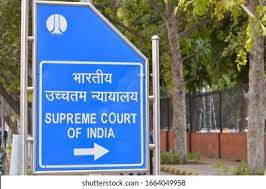The correctness of the judgment and order of the trial court convicting and sentencing the appellant for life imprisonment for an offence under Section 302 read with 34 of the Indian Penal Code (“IPC” for short) and that of the High Court affirming the same is the subject-matter of examination in this appeal. (Para 3)
The only issue for consideration in this appeal is whether the appellant shared common intention along with other coaccused to kill the deceased Ram Kishore. (Para 4)
In the case at hand, it is clearly stated in the FIR and also categorically stated by Balram (PW-1) that Rajaram, Ram Naresh and Jogendra had lathis in their hands and Virender had iron rod in his hands. Rajaram by shouting instigated all of them to kill Ram Kishore. The accused persons having cornered/gheraoed Ram Kishore assaulted him with lathis and iron rod. Rajaram, Jogendra and Ram Naresh armed with lathis and Virender armed with iron rod assaulted Ram Kishore to death. The witness (PW-1) could not be shaken in cross examination and consistently stated that all the accused persons surrounded his brother Ram Kishore and assaulted him together. Thereafter, all of them left together. (Para 9)
A plain reading of the above paragraph reveals that for applying Section 34 IPC there should be a common intention of all the coaccused persons which means community of purpose and common design. Common intention does not mean that the co-accused persons should have engaged in any discussion or agreement so as to prepare a plan or hatch a conspiracy for committing the offence. Common intention is a psychological fact and it can be formed a minute before the actual happening of the incidence or as stated earlier even during the occurrence of the incidence. (Para 13)
The aforesaid decision instead of helping the appellant rather supports the prosecution that the appellant was rightly convicted with the aid of Section 34 IPC for the offence of killing the deceased as they all had come armed, assaulted him together and thereafter left the place of occurrence together. (Para 14)
In view of the evidence on record and the findings of the trial court and the High Court as narrated above, the submission that the appellant cannot be convicted with the aid of Section 34 IPC is bereft of merit and cannot be sustained. Accordingly, appeal sans merit and is dismissed. (Para 16)
SUPREME COURT OF INDIA
2023 STPL(Web) 460 SC
[2023 INSC 1037]
Ram Naresh Vs. State Of U.P.
Criminal appeal no. 3577 of 2023-Decided on 1-12-2023
https://stpllaw.in/wp-content/uploads/2023/12/2023-STPLWeb-460-SC.pdf







